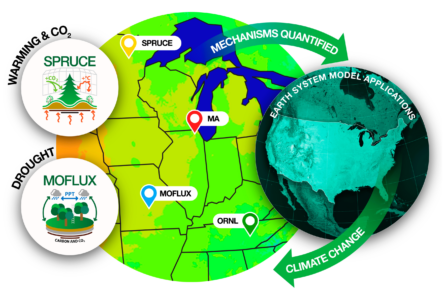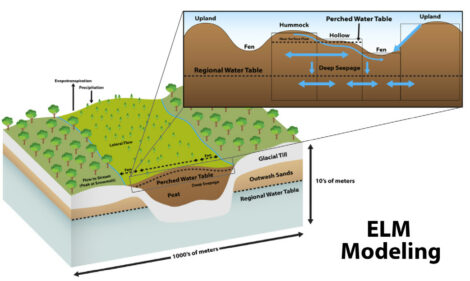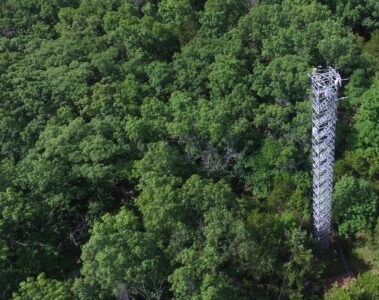Research to understand and predict the interaction of Earth’s terrestrial ecosystems and climate and to assess vulnerability of terrestrial ecosystems to projected environmental change

Research Themes and Locations. Themes are driven by global climate and environmental change issues. Major field studies are located at ecotone boundaries for moisture (SPRUCE at upland–wetland and MOFLUX at forest–prairie). Process research is carried out at Oak Ridge National Laboratory (ORNL) and the Morton Arboretum (MA). Modeling efforts are located primarily at ORNL with the support of key partners.
Project website | FRED podcast | Overview brochure PDF
Principal investigator: Paul J. Hanson
Annual reports: 2021 | 2020 | 2018 | 2017 | 2016 | 2014 | 2013 (Note: Reports are not issued during SFA review years.)
Terrestrial ecosystems store increasingly vast amounts of carbon they remove from the atmosphere as carbon dioxide (CO2). Climate change is expected to alter the balance of carbon release and uptake across these systems and impact vulnerable carbon stores. Earth system models predict that as temperature and precipitation regimes change, climate-carbon feedbacks will overwhelm physiological-carbon feedbacks. Such impacts will make large terrestrial carbon stores vulnerable to loss in the form of greenhouse gas releases to the atmosphere, further exacerbating climate change.
To address this challenge, the U.S. Department of Energy’s (DOE) Biological and Environmental Research (BER) program supports the Terrestrial Ecosystem Science (TES) project at Oak Ridge National Laboratory (ORNL). TES is a Science Focus Area (SFA) that aims to understand fundamental responses and feedbacks of terrestrial ecosystems to climatic and atmospheric change. SFA research includes manipulations, multidisciplinary observations, database compilations, and fundamental process studies integrated and iterated with modeling activities at multiple scales.
The dominant manipulation is the Spruce and Peatland Responses Under Changing Environments (SPRUCE) experiment that tests responses to multiple levels of warming at ambient and elevated CO2 for a peatland ecosystem. Long-term observations of ecosystem function at an eddy covariance site in Missouri (MOFLUX) characterize ecosystem response to dominant hydrologic limitations. Research activities at SPRUCE and MOFLUX cover a spectrum of environmental drivers and complement each other. Process-level work occurs at smaller scales and aims to improve mechanistic representation of processes within terrestrial biosphere models.
Key Questions
Terrestrial Ecosystem Science (TES) research focuses on 5 questions that target key knowledge gaps and uncertainties in climate and disturbance responses of boreal and temperate ecosystems.
- By how much and by which mechanisms will warming affect southern boreal peatland ecosystem productivity, carbon storage, and greenhouse gas fluxes? Can elevated carbon dioxide ameliorate the likely negative effects of warming?
- How do water availability and water cycle extremes interact with climate change to regulate net ecosystem exchange and energy balance within temperate and boreal forests?
- How does environmental change alter nutrient distribution and dynamics, and what are the implications for understanding and predicting ecosystem carbon fluxes?
- How do temperature, water availability, and plant inputs affect soil carbon and microbial functions, and what are the implications for ecosystem carbon storage and greenhouse gas fluxes?
- Are North America’s humid, high-carbon ecosystems more vulnerable to changing climate and disturbance regimes than the Climate Model Intercomparison Project Phase 6 predicted? How does the collective knowledge gained from the TES research affect understanding of carbon feedbacks in the region?
Research Themes
TES research is integrative, question-based, hypothesis-driven, and iterative to provide robust advances in Earth system predictability. Key uncertainties about vulnerable ecosystems and their effects on the Earth system arise from incomplete scientific knowledge and are identified through empirical research, literature synthesis, and model analysis.
TES focuses on ecosystems subject to water, energy, and nutrient constraints whose impacts are highly uncertain in Earth system models. The SFA seeks to answer one overarching question: How vulnerable to climate change are carbon stores of terrestrial ecosystems in eastern North America, and what are the implications for carbon-climate feedbacks?
The SFA is organized around five research themes: peatland carbon cycle responses to warming and elevated CO2, water carbon and energy processes under compounding climatic stressors, nutrient-carbon feedbacks, microbial and soil carbon–cycling processes, and regional integration and extrapolation. Each research theme deploys a mixture of interactive approaches to yield new understanding and improve models for each focused topic.
Research Approach

Energy Exascale Earth System Model (E3SM) Land Model (ELM). TES will maintain ELM-Peatlands as a branch of E3SM, integrating developments as appropriate for offline ELM testing and completely integrating it into ELM in 2028 to allow fully coupled simulations.
TES integrates experimental and observational studies with model building, parameter estimation, and data analytics to yield reliable model projections. This integrated model-experiment approach focuses on improving the land model (ELM) of DOE’s Energy Exascale Earth System Model and fosters an enhanced, interactive, and mutually beneficial engagement between models and experiments.
Model predictions are continuously improved through parameterization, calibration, and the development of new process-based submodels focused on key aspects of wetland, boreal, and temperate forest systems. Larger-scale data products, synthesis, and modeling broaden and scale mechanistic understanding beyond the confines of individual sites.
Community engagement, data synthesis, and modeling are key to understanding how the results of this groundbreaking manipulation can extrapolate to the larger boreal ecotone and to defining the implications for future climate and peat carbon storage. SPRUCE and MOFLUX research sites and TES datasets are open to the science community for exploring supported disciplinary studies.

